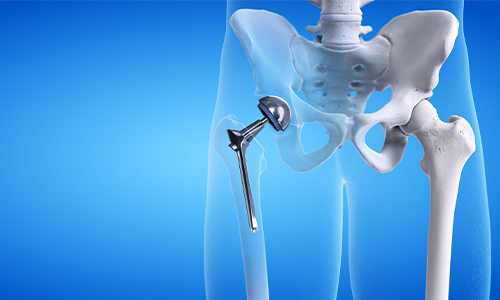More than 90% of Total Hip Replacements on adults older than 50.
A Total Hip Replacement is a surgical procedure. An orthopedic surgeon will replace your hip (or parts of it) with a human-made implant (a prosthesis). Your surgeon might refer to a hip replacement as a hip arthroplasty (a joint replacement surgery).

Orthopedic Surgeon at Shreya Hospital will usually only recommend a hip replacement after other, more conservative treatments don’t relieve your pain or mobility symptoms. The recovery time can take up to 12 weeks, but most people who’ve had a hip replacement live with it for the rest of their lives. Surgeons perform more than 90% of hip replacements on adults older than 50.
Types of Hip Replacements
Your surgeon will perform either a total hip replacement or a partial hip replacement:
- Total hip replacement: A surgeon will replace your whole hip with a prosthetic joint. They’ll replace the top (femoral head) of your thighbone (femur) and the socket it fits into (acetabulum). Almost all hip replacements are total hip replacements.
- Partial hip replacement: Partial hip replacements are very rare. Your surgeon will replace only part of your hip. These are usually only done to repair certain types of broken hips (hip fractures) or to remove certain types of tumors.
Causes behind going for Total Hip Replacements
You Orthopedic Surgeon might recommend for a hip replacement if symptoms in your hip are making it hard (or impossible) to participate in your daily routine. Most people who get a hip replacement try other, more conservative treatments like medication, physical therapy or using a cane or walker before needing surgery. Your provider will probably suggest these kinds of treatments before recommending a hip replacement.
Arthritis is the most common cause of hip pain and other symptoms that lead to people needing a hip replacement. Some of the most common types of arthritis can affect your hip, including:
- Osteoarthritis.
- Rheumatoid arthritis.
- Psoriatic arthritis.
Other health conditions and issues that can damage your hip joint enough to require a hip replacement include:
- Osteonecrosis.
- Traumas like car accidents or falls.
- Femoroacetabular impingement syndrome (FAI or hip impingement).
- Hip dysplasia.
- Benign tumors (neoplasms).
- Cancer.
- Perthes disease.
Before Total Hip Replacement
Your surgeon will perform a physical exam and some tests before your hip replacement surgery. They’ll ask you about your symptoms and check your current range of motion (how far you can move your hip). Tell your surgeon about any medications and supplements you’re taking.
Your surgeon will compare the hip you’ll be replacing with your other hip. They’ll have you move your hip in different directions. These motions will help them check the muscles that support your hip and leg.
You’ll probably need several tests before a hip replacement, including:
- Hip X-rays.
- Blood tests like a basic metabolic panel (BMP).
- Urinalysis (testing your pee).
You might need other imaging tests in addition to X-rays. Your surgeon might order:
- Magnetic resonance imaging (MRI).
- A computed tomography (CT) scan.
- An electrocardiogram (EKG).
Procedure of Total Hip Replacement
During a hip replacement, your surgeon will remove some or all of your hip and replace it with a prosthesis. You’ll receive regional anesthesia before your surgery. Regional anesthesia blocks pain in a large area of your body but doesn’t completely put you to sleep. Some providers refer to regional anesthesia as a spinal or a spinal block.
No matter which type of hip replacement you need, your surgeon will remove bone and cartilage from your existing hip joint and replace it with the prosthesis. Prosthetic hips are usually made of metal, plastic or ceramic. How long your surgery will take depends on which type of hip replacement you’ll need.
Benefits of Total Hip Replacement
Hip replacement Surgeries conducted by the Orthopedic Surgeon of Shreya Hospital are very successful surgeries. Most people who have a hip replacement experience a dramatic decrease in their symptoms — especially pain and stiffness. You can get feed back from our old patients.
Once you’re fully recovered, you should have increased mobility and range of motion (how well and how far you can move your hip). A hip replacement usually makes it easier to walk, climb stairs and do other physical activities.
 Dr. Mishra’s Shahdara Orthopaedic Center Shahdara Orthopaedic Center, Best Orthopaedic Doctor in Shahdara, Delhi
Dr. Mishra’s Shahdara Orthopaedic Center Shahdara Orthopaedic Center, Best Orthopaedic Doctor in Shahdara, Delhi
